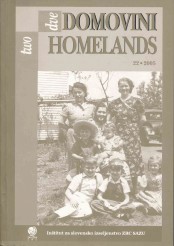THE RESPONSE OF SLOVENIAN TEACHERS TO THE MIGRANT CHILDREN FROM FORMER YUGOSLAVIA
Keywords:
migrant children from fonner Yugoslavia, Slovenian primary school teachers, school results, social inclusion, teachers’ responsibilityAbstract
The aim of this article is to highlight the situation of the migrant children from former Yugoslavia in primary school in Slovenia.
Contemporary school presents teachers with new and relatively high demands which should contribute towards democratisation of relationships and social justice in school. From the aspect of learning outcomes, teachers are required to offer differentiated and individualised lessons which should enable students to acquire as high levels of knowledge as possible.
From the developmental aspect, they are required to include all students who should with maximum assistance achieve at least minimal levels of knowledge. Thus, the teacher is expected to be willing to build a class community of individuals who show solidarity and responsibility towards each other, who are able to show respect for and acceptance of difference, and are thus developing their skill to constructively participate in a society of different human beings.
We asked ourselves to what extent teachers felt responsible for the migrant children school results and their social inclusion in the class. In regards to the first question, we asked a representative sample of primary school teachers whether factors such as the child’s traits, the situation in the class and the situation at home affect the migrant child’s level of school achievement, and if so, to what extent. In regards to the second question, we tried to establish the role of the child’s parents, the child himself, the other children and their parents, and the teacher in the migrant child’s social inclusion in the class.
Results of our study show that Slovenian teachers feel considerably less responsible for achievements of migrant children than for the achievements of other children, and, furthermore, do not feel responsible for migrant children’s successful inclusion in the class. The question therefore is where this feeling of irresponsibility towards migrant children felt by teachers comes from.
For this reason, it is necessary to pay utmost attention to making teachers aware of their key role in implementing moral and educational goals of education as well as teaching them to be more sensitive to the real problems of migrant children and to be better prepared for intercultural education.
Downloads
References
Bela knjiga o vzgoji in izobraževanju v Republiki Sloveniji, (ur. Janez Krek). (1997). Ljubljana: M inistrstvo za šolstvo in šport, 343 str.
Blažič, M., Ivanuš Gnnek, M., Kramar, M., Stnnčnik, F. (2003). Didaktika (m onografija). Novo mesto: Visokošolsko središče, Inštitut za raziskovalno in razvojno delo, 422 str.
Kroflič, R. (2004). Učiteljeva zaveza vzgojnim ciljem javne šole. Sodobnapedagogika, posebna izdaja, str. 76-89.
Lesar, I., Čuk, I., Peček, M. (2005). M nenja osnovnošolskih učiteljev o njihovi odgovornosti za učni uspeh. Sodobna pedagogika, 56, 1, str. 90-107.
Marentič Požarnik, B. (2000). Psihologija učenja in pouka. Ljubljana: DZS, 299 str.
Peček, M. (2005). Is primary school in Slovenia just and fair: the case o f migrant children from fonner Yugoslavia. Dve domovini/Two Homelands (ta številka revije).
Šolska zakonodaja (1996). Ljubljana: M inistrstvo za šolstvo in šport, 219 str.
Učenje - skriti zaklad .poročilo Mednarodne komisije o izobraževanju za enaindvajseto stoletje, pripravljeno za UNESCO, (ur. Delores J.). (1996). Ljubljana: M inistrstvo za šolstvo in šport RS, 261 str.
Downloads
Published
How to Cite
Issue
Section
License

This work is licensed under a Creative Commons Attribution-NonCommercial-NoDerivatives 4.0 International License.
Authors guarantee that the work is their own original creation and does not infringe any statutory or common-law copyright or any proprietary right of any third party. In case of claims by third parties, authors commit their self to defend the interests of the publisher, and shall cover any potential costs.
More in: Submission chapter





